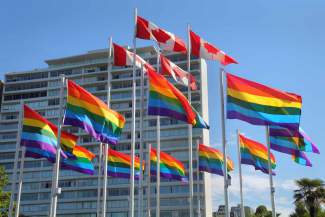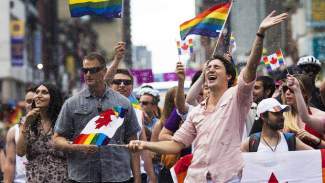When you are fleeing your anti-LGBTQ nation in order to survive, the last thing that may cross your mind is to have to prove your true sexuality after years of hiding it. But LGBTQ refugees looking to remain in Canada after today. May 1, 2017, will have to start meeting new guidelines established by the government. With this very sensitive topic, best practices need to be established and expectations for decision makers sitting on refugee boards nationwide should be consistent and not relying on guessing, possibilities, or stereotypes.
“Before this, we’ve had to rely on board members having good judgment, having good discretion,” said Sharalyn Jordan, an organizer with Vancouver’s Rainbow Refugee, which assists LGBTQ claimants. “This makes me very hopeful that we will start seeing more consistent, more just decisions.”
The guidelines warn against stereotyping and against applying standards from Canada to claimants from other countries. They highlight the impact that trauma has on people’s memories. And they urge decision makers to weigh evidence in the context of ongoing persecution: Would it be safe for a lesbian in a homophobic regime to walk back into the police station where she was jailed, without charge, to ask for her police records so Canadian officials could pore over them later?
“This is intended to promote a greater understanding of the diversity and complexity of the situation of sexual and gender minority individuals,” Anna Pape, a spokesperson for the Immigration and Refugee Board of Canada, said of the new guidelines, which involved consultations with LGBTQ advocates, researchers, refugee lawyers and social workers. – The Globe
According to a 2016 report titled State-Sponsored Homophobia, roughly 73 countries outlaw gay sex, of which 13 back up the law with the death penalty.
Some 2,234 refugees claimed asylum in Canada on the basis of their sexual orientation between 2013 and 2015, according to Prof. Rehaag. Of those claims, 70.5 per cent were successful – a figure higher than the overall grant rate to all refugees of 62.5 per cent. Fraudelent claims remain extremely rare: just 2.2 per cent of all refugee claims were declared to have no credible basis or to be fraudulent in 2013, Prof. Rehaag said.
The Globe goes on to call the new Canadian guidelines "a step in the right direction." But of course the article states the obvious – it's difficult to determine a person's sexual orientation. Coupled with the impossible are horrific and gruesome accounts that seem not credible, unbelievable
Still, it remains incredibly difficult to fairly determine a person’s sexual orientation. In other cases, the homophobic attacks are so gruesome that Canadian decision makers find them implausible – and the claimant not credible as a result.
“It is not a case of board members being overtly homophobic or transphobic but … of ethnocentric criteria being applied,” said Rainbow Refugee’s Prof. Jordan, who teaches psychology at Simon Fraser University. “Assumptions that Canadians have about lesbian, gay, bi, or trans identities and the ‘coming out’ model – that people will be in relationships and seek out community as soon as they arrive – these myths and stereotypes don’t fit for somebody who is fleeing persecution.” – The Globe
For some personal accounts, head over to The Globe to read their interviews with five gay refugees from all over the world about being exiled and finding their way to Canada.
h/t: The Globe



